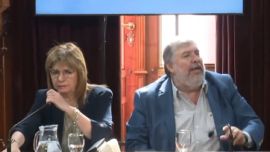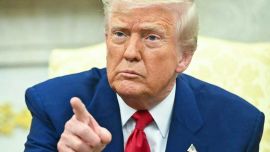Brazil pushed back against US criticism that President Luiz Inácio Lula da Silva is parroting Russian and Chinese propaganda on the Ukraine war as he held talks with Moscow's top diplomat.
Lula's meeting Monday with Sergei Lavrov in Brasilia follows state visits to China and the Middle East, during which Lula said the United States should "stop encouraging war and start talking about peace" in Ukraine.
He also claimed Kyiv shares the blame for the conflict, which began when Russian forces poured into Ukraine in February 2022.
Lula's remarks echoed a line frequently used by Moscow and its strategic ally Beijing, which blame the West for the war.
In addition to earning a US reproof the comments drew frustration Tuesday from Kyiv, which warned Brazil's leader was giving "equal weighting" to Ukraine and Russia over the war's origins.
China seeks to position itself as neutral on the Ukraine conflict, but has maintained its partnership with Moscow and refrained from imposing sanctions.
Recent remarks
In the Brazilian capital, Lavrov thanked Lula for his discussions last week on seeking to help mediate peace talks.
But Lula's recent remarks on Ukraine sparked criticism from the White House, which has spearheaded international efforts to isolate Moscow and bolster Kyiv.
"In this case, Brazil is parroting Russian and Chinese propaganda without at all looking at the facts," US National Security Council spokesman John Kirby told reporters on Monday.
He described Lula's message on the war as "deeply problematic."
Brazilian Foreign Minister Mauro Vieira, who had also met with his Russian counterpart, shot back, saying: "I don't know how or why he reached that conclusion but I do not agree at all."
Despite Lula's comments about the United States, the 77-year-old, who returned to power in January after serving two terms from 2003 to 2010, is also seeking closer ties with Washington.
His visits to China and the United Arab Emirates came after meeting in February with US President Joe Biden.
But Lula's latest remarks antagonised Kyiv, which stressed Brasilia was denying Russian aggression as the cause of the conflict.
"An approach that gives equal weighting to the victim and the aggressor and accuses countries that help Ukraine defend itself against deadly aggression of encouraging war, does not correspond to the real state of affairs," Ukraine's foreign ministry spokesman Oleg Nikolenko wrote on Facebook.
Latin America tour
G7 foreign ministers warned Tuesday that any nation helping Russia's war effort would face "severe costs."
Meeting in Japan, the top diplomats from the world's leading economies pledged to crack down on those helping Russia evade sanctions and acquire weapons.
Brazil has not joined Western nations in imposing sanctions on Russia for its invasion, and has refused requests to supply ammunition to Ukraine.
"We are grateful to our Brazilian friends for their clear understanding of the genesis of the situation (in Ukraine). We are grateful for their desire to contribute to finding ways of settling this situation," Lavrov said after meeting with his Brazilian counterpart.
Russia desires a swift end to the conflict but any solution would have to be based on "multipolarity," he said, accusing the West of "trying to dominate the international arena."
Washington does not have "any objection to any country that wants to try to bring an end to the war," Kirby said.
"That could happen right now, today, if Mr [Russian President Vladimir] Putin would stop attacking Ukraine and pull its troops out."
Brazil is Lavrov's first stop on a weeklong Latin American tour that will include Venezuela, Nicaragua and Cuba – countries with leftist governments hostile to Washington.
– TIMES/AFP



















Comments